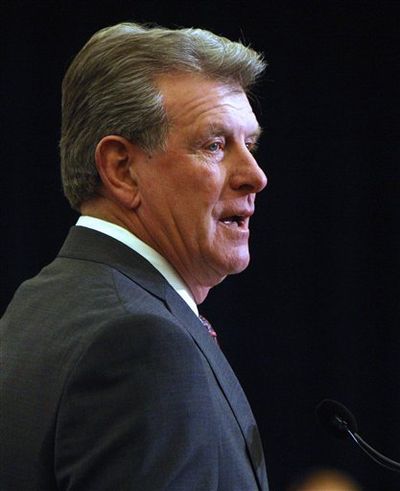Otter: WiFi contract ‘not how I would have done it’

BOISE – Idaho Gov. Butch Otter weighed in on state schools chief Tom Luna’s controversial multi-year, multimillion-dollar contract for WiFi networks in Idaho high schools on Monday, saying, “It’s not necessarily how I would have done it.”
Otter stopped short, however, of saying what he’ll recommend to lawmakers for next year’s budget – when the $2.25 million one-time appropriation on which Luna relied to fund the contract for the coming year will automatically expire.
Luna signed the contract last week with Education Networks of America, a politically connected firm that had supported his campaign, for $2.11 million a year for five years, with options to renew for up to 15 years. If the contract runs the full 15 years, it will cost the state $33.3 million.
“I have been and will continue to be supportive of technology in the classroom,” Otter said. “I understand and I agree with the concerns people have expressed over the contract, particularly the character of the money being utilized - one-time funds relative to the on-going obligation.”
He added, “The contract is signed and issues specific to it should be taken up with the superintendent and the State Department of Education. It’s not necessarily how I would have done it. Going forward I intend to work with Superintendent Luna and the Legislature as we continue to look at ways to improve education in Idaho.”
Luna, who couldn’t be reached for comment Monday afternoon, said earlier that he believed the long-term contract was the most cost-effective way to install Wi-Fi networks in every Idaho high school, and said if lawmakers don’t fund it in future years, the contract will be automatically canceled. However, the contract also states that the vendor owns all equipment it installs, and if the deal is canceled, the vendor must remove the networks it had installed in Idaho high schools.
Otter, in his State of the State message to a joint session of the Legislature this year, said, “I am pleased to report to you that I’ve done as promised and brought you a General Fund budget recommendation that is structurally sound, with no one-time revenue used for ongoing financial obligations.”
Both Otter and Luna included in their budget proposals $33.9 million in the public school budget to fund whatever recommendations might come forth from a 31-member education stakeholders task force that Otter appointed to look into possible reforms, in the wake of the voter-rejected “Students Come First” school reform laws. Those laws rolled back teachers’ collective bargaining rights, imposed a new merit-pay bonus plan, and required a laptop computer for every high school student and a new focus on online learning.
But the task force hasn’t made any recommendations yet, and isn’t scheduled to until late summer at the earliest. Its proposals will go to Otter in the fall for consideration for next year’s budget.
So the state Legislature specifically designated that amount within the school budget for the coming year for one-time only projects. That way, it’s zeroed out at the end of the fiscal year, and the governor and lawmakers will have the opportunity to propose different uses for it the following year when the stakeholders task force recommendations are in.
In addition to the $2.25 million for high school wireless networks, the designated one-time funds in the public school budget include $21 million for one-time teacher performance-pay bonuses; $3 million for technology pilot projects; $8 million for school district classroom technology needs; and $150,000 for a web portal of online classes available to Idaho students.
The total: $34.4 million.
The $34.4 million is the only part of the $1.3 billion school budget for next year that’s designated as one-time only.
Paul Headlee, the legislative analyst for the public school budget, said, “At the time of the governor’s recommendation, he had $33.9 million in his budget recommended for the task force … but the budget was moving faster than the task force could go, JFAC and the Legislature approved it as one-time.”
He added, “It comes out of the base automatically. That whole $34 million comes out of the base. … It puts it in play again,” when the governor and legislators begin debating the following year’s budget.
Idaho’s state budget typically designates only a limited amount of funding as “one-time,” generally for items like equipment replacements. The majority of the budget is ongoing funding, recognizing the cost to continue the program or service in the future.
Legislative Budget Director Cathy Holland-Smith, who has worked in the legislative budget office since 1994, said she’s not aware of any other instance in which an agency signed an ongoing, multi-year contract based on a one-time appropriation.
When the state boards of dentistry, pharmacy and medicine received a $548,000, one-time appropriation last year for a new licensing system, then belatedly discovered that leasing – rather than buying – the new equipment would be more cost-effective, they didn’t spend the money. Instead, they returned the one-time funds, came back to the Legislature this year and were instead given $137,400 a year in ongoing funds to pay for the lease.
Under the “Students Come First” laws, a huge contract issued to buy laptops for every Idaho high school student also called for Education Networks of America to install Wi-Fi networks in every Idaho high school; that contract was canceled after the repeal of the laws.